
Melbourne’s first Lodge, as seen in the press, 1839-40
Saturday, April 18, 2020
The first Freemasons Lodge in Melbourne – Australia Felix – was formed in December 1839. These were the days of a young Queen Victoria.
FVNews Editor Ash Long takes a look at how Freemasonry was reported by Melbourne’s newspapers from the start, and throughout the first year of 1840.
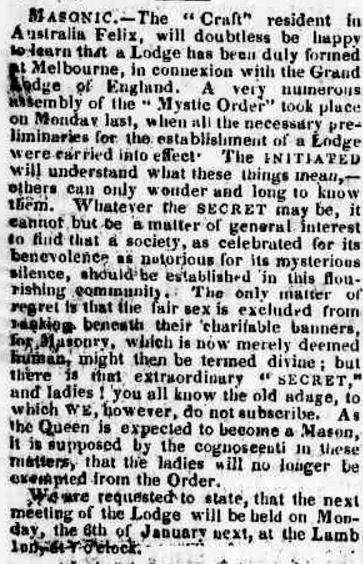
Monday, December 30, 1839
“The ‘Craft’ resident in Australia Felix, will doubtless be happy to learn that a Lodge has been duly formed at Melbourne, in connexion with the Grand Lodge of England,” noted a report in the Port Phillip Patriot newspaper on Monday, December 30, 1839.
“A very numerous assembly of the ‘Mystic Order’ took place on Monday last, when all the necessary preliminaries for the establishment of a Lodge were carried into effect.

“The INITIATED will understand what these things mean – others can only wonder and long to know them. Whatever the SECRET may be, it cannot but be a matter of general interest to find that a society, as celebrated for its benevolence, as notorious for its mysterious silence, should be established in this flourishing community.
“The only matter of regret is that the fair sex is excluded from ranking beneath their charitable banners, for Masonry, which is now merely deemed human, might then be termed divine; but there is that extraordinary ‘SECRET’, and ladies! you all know that old adage, to which WE, however do not subscribe.
“As the Queen is expected to become a Mason, it is supposed by the cognoscenti in these matters, that the ladies will no longer be exempted from the Order.
“We are requested to state, that the next meeting of the Lodge, will be held on Monday, the 6th of January next, at the Lamb Inn at 7 o’clock.”

W. F. E Liardet (Wilbraham Frederick Evelyn), 1799-1878. [1875]
Courtesy: State Library of Victoria
The Old Lamb Inn had been at the corner of Franklin and Elizabeth Streets, transformed in later years to banking premises, said The Argus (April 17, 1923).
“The Old Lamb Inn about 1851 was for the most part a carriers’ house, used by waggoners trading with the diggings, and as such was as peaceful and well conducted as the spirit of the times permitted.
“As time progressed, however, it became the resort of criminals and desperadoes, who sought refuge there from the glare and searchlight of the city, and crept into these darker haunts beyond the limits of the then small police patrol.
“About 1866 and 1867, therefore, the Old Lamb Inn had very little of the “lamb” left in its composition, but had rather taken on the guise of the
“lion.” It became, so it is stated, a perfect nest for thieves and criminals. It is believed that Morgan and Power, notorious bushrangers, were at one time occasional visitors to the inn. “
Freemasons were amongst the first free settlers in Victoria. Initially Lodges worked under the separate constitutions of the Grand Lodges of England, Scotland and Ireland, but in 1889 the United Grand Lodge of Victoria brought the Lodges together.

The first Grand Lodge, the Grand Lodge of England, was founded on June 24, 1717 when four London Lodges met for a joint dinner, proclaiming themselves pre-eminent and assuming regulatory control over Freemasonry in England.
In the meantime, the popularity of Freemasonry was spreading internationally. Grand Lodges were formed in Ireland in 1725 and Scotland in 1736. By the 1730s Freemasonry had also been exported to the British Colonies in North America and after the American Revolution, Grand Lodges began to form in each of the American states, says the Freemasons Victoria website.
The years 1839-40 saw a great connection continuing with Britain. Australia was a colony. The Port Phillip Gazette newspaper (Sat., Aug. 24, 1839) had noted the involvement of Freemasons with the laying of the Foundation Stone at the new Parliament House in London.
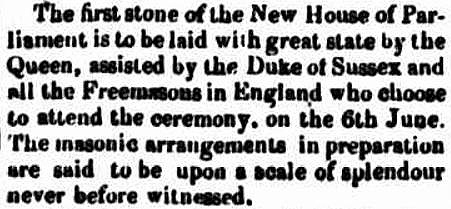
The Gazette (“edited by George Arden, of Elizabeth Street; printed and published by Thomas Strode [joint proprietors] at the Printing Office, in Queen Street, Melbourne, Port Phillip”) recorded:
“The first stone of the New House of Parliament is to be laid with great state by the Queen, assisted by the Duke of Sussex and all the Freemasons in England who choose to attend the ceremony, on the 6th June. The masonic arrangements in preparation are said to be upon a scale of splendour never before witnessed.”
Freemasonry in Australia began when 21 influential men drew up a petition on December 23, 1839, to form a Masonic Lodge, to be called the Lodge of Australia Felix.
Freemasonry has been here since the First Fleet and has played a pivotal role in the growth and establishment of our state. The Foundation Stones of some of the most prominent and culturally significant buildings in Melbourne and beyond were placed by prominent Freemasons – the Melbourne Court House, Melbourne Hospital, the Princes Bridge and many more.

In January 1840 there was an outbreak of letters about Freemasonry in the Melbourne press. One writer labelled himself as ‘Master Mason’; his opponent was ‘A Knight Templar’.
‘Master Mason’ alleged that the “score” of members at the first meeting had put themselves into positions of privilege.
‘A Knight Templar’ replied: “It being contrary to the principles of
Freemasonry to create a feeling of disunion or discord amongst the craft, but still less to cast anything like public odium upon their proceedings —
your Correspondent signing himself ‘ A Master Mason” requires no other evidence beyond his letter in your juurnal of this day, to convict him of assuming a title and an honor to which he has no just claim.
“The subjects which he has thus brought under public review, are not matters of public interest, they appertain solely to the consideration of the fraternity; and if the measures hitherto adopted, of which your Correspondent complains, be irregular, there is an appointed tribunal before which the “projectors” can be arraigned, and if in error can be duly admonished.
“But, Sir, in order that the public should not be misled by the specious mode of his address, I venture to crave the columns of your journal to
contradict the assumptions of your Correspondent.
“First.— He states that the ‘ utmost publicity’ should have been given to the matter of establishing a Lodge before the first meeting was held.’
In answer to this it is only necessary to say, that there is a positive law of the order, which forbids such a mode of proceeding.”
‘A Knight Templar’ said there were three times of Freemasons the prescribed number present. He dismissed the criticisms.
The Patriot (Jan. 29, 1840) published its account: “Wednesday last being the Anniversary of one of the titular saints of the Order, was observed by the Members of the Lodge of Australia Felix with all the pristine usages of the Masonic ceremonials.
“At the hour of “high twelve,” the Brethren assembled at their Lodge Room in Collins-street, when an investiture of several Officers took place., and three gentlemen were admitted into the arena of Freemasonry.
“The half-yearly roll of Members was duly certified, and directed to be transmitted to the proper authorities; and it was gratifying to observe the increase that had taken place during the past three months from twenty-five to seventy.
“The usual official returns were laid upon the.table, and the
necessary orders were given respecting them. About five o’clock business being concluded, the Brethren congregated upon this
occasion formed themselves into a procession, and bearing the implements of Masonry and Lodge paraphernalia, proceeded to Mr. Mills’ large room, which was fitted up for the banquet, the Lodge room not being sufficiently capacious .to entertain so numerous an assemblage.
“Every thing being duly arranged in order,” the doors of the banquet room were thrown open for the admission of such ladies
and gentlemen as might ibe desirous of inspecting the “mystic implements,” but there being no public announcement of either a
procession or such exhibition, but few of the uninitiated honoured The Fraternity upon the occasion.
“At seven o’clock the signal was given for the guests to be seated, and the table was immediately surrounded by the Fraternity;
and the Stewards having made arrangements accordingly, each member soon found his allotted seat, and thus not only was the table made to accommodate the party assembled, but no confusion could ensue.
“Upon the removal of the cloth, Non nobis Domine was sung in very creditable style.
‘The Chairman -having requested the Brethren to fill bumpers, reminded the Brethren that as loyalty was one of the chief duties of a Mason, and this being the first opportunity offered in Australia Felix for any public assembly to manifest their feelings of attachment to the Queen, as sovereign of the British Empire, since the announcement in this Colony of her marriage, he trusted the company would do appropriate honor ” To the health
of Her Majesty the Queen, God bless her.”
“This toast was received with the most enthusiastic cheering-
God Save the Queen, sung as a trio — the Brethren joining in the chorus.
“The Chairman. — I have next to propose to you the toast of all others especially calling into action your Masonic feelings, when I announce the name of His Royal Highness the Duke of Sussex, under whose dominion our present Lodge has been created, and who for the twenty-seventh time has been elected Grand Master of our Order. (Masonic song )
“The Chairman having again called for bumpers, prefaced the toast by observing, “that after evincing our loyalty to the throne, and attachment to our Grand Master, it was a gratification for Freemasons to have any opportunity of acknowledging their respect to the constituted Government of the country. It was therefore with much pleasure that he proposed ” The health ol His Honor the Superintendent, and success to the Government —
(Three times three and a song.)
“The P.M. next claimed the notice of the brethren – “I have permission,” said he, “from your Chairman, to submit the next toast, which I have infinite satisfaction in complying with. I cannot claim much more than professional acquaintance with the Deputy Provincial Grand Master of the Colony, but having had the honor of meeting him in Masonry, I can testify to his zeal and anxious desire to promote the interests of the Craft, and it is, therefore, with considerable pleasure that I propose his health,”
(Masonic Song)
“As we were not enabled to follow the routine of toasts with strict attention, sufficient for the publication of all that was said and done,” we must content ourselves with a summary, our limits indeed not permitting us to do justice to the many excellent
speeches that were delivered during the evening.
• ” The Grand Master of Ireland,”
• “The Grand Master of Scotland,”
• ” The W.M. and officers of 548, and the Sydney Lodges,”
• “The Masters and Officers of Lodges at Van Diemen’s Land.”
• “The W.M. and Officers of 613 at Adelaide,”
were all drank with the ” honors” appropriate, and produced on the part of the assembly a manifestation of warm and friendly
regard.
“The Chairman claimed the attention of the brethren to a toast that he was sure all present would duly appreciate. He regretted
that the duties of the day had devolved upon him, in the absence of the W.M., a place he felt bis own incompetency to fill. But it was with sincere pleasure that he proposed the health of the Master of the Lodge, who was at present sojourning in the sister-colony, and who well merited every eulogium either as a Mason or a man, that could be paid to his name. The health of Captain Smyth.”
“The W.P.M, next proposed the health of the Chairman, who in reply, after thanking the brethren for the very cordial manner in
which his health had been greeted, observed that this day he was enabled to say with proud satisfaction he had initiated the one
hundred and sixth member into Freemasomy, amongst the earliest of whom was our present Dep. Pro. G Master.
“The following toasts succeeded,
• “The brethren who had promoted the harmony of the day by their vocal talents,”
• “The Visiting Brethren.”
• The Wardens and other officers of the Lodge.”
• “The Stewards,”
• “The absent Members.”
• “The Sisterhood.”
The above Toasts were accompanied by the several Glees,
• Myndeer Van Junck”
• Lifes a Bumper”
• Red Cross Knight”
• With a Jolly full Bottle”
• To all you Ladies”
• The Witches”
• Here’s a health”
• Dame Durden” &c, &c.
“And two of the Brethren favoured the company with occasional Duets on the Cornopoeans which added considerably to the
evening’s hilarity.
“As a parting Toast, the Chairman reminded the Brethren ot one of the most important considerations of their Masonic Duties, implied in the toast “To all distressed Masons round the globe”
This was followed by Rule Brittannia, during which the table was cleared, and the Brethren departed, all expressing themselves highly pleased with their days ” labor and refreshment.”
“Want of space compels as to notice but briefly the dinner which was furnished by Mr. Overton, and was served up in his usual good style, and it is only necessary to mention that the wines were furnished by Mr. Cropper to ensure their excellence.
“Before we close this notice however we have great pleasure in stating that a jewel (to be procured in England) was voted to acting W.M Stephen for his valuable assistance to the Lodge, and in order that it should not be charge upon the Lodge Funds, a subscription for the purpose was raised among the Brethren,
“We also are gratified in stating that a vote of thanks inscribed and framed was presented to Brother J, Cropper for the important services he had rendered the Lodge of Australia Felix.”
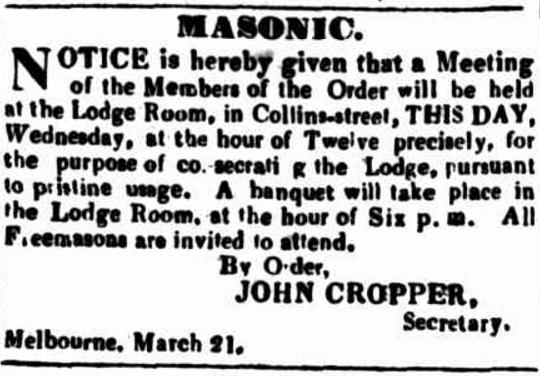
The consecration of the Lodge took place on March 25, 1840. The address was more salubrious: Collins Street, Melbourne.
The Gazette (June 10, 1840) spoke of the possibility of Masonic funds being combined with those of the Mechanics’ Institute to fund a joint building.
“SCHOOL OF ARTS – A subscription has been entered into for the purpose of erecting a building for the accommodation of the Mechanics School of Arts, With this view, and to lessen as much as possible the expense, it has been proposed to join the amount to the funds that shall be raised for the purpose of building a Masonic Lodge, and by this combination to make one erection serve the purposes of both. There is no difficulty expected in effecting this, and where so much of energy and power are directed to
the same object, we may very soon expect to witness its accomplishment.”
The Patriot (June 18, 1840) reported on ‘Nocturnal Gambols’: “It appears that Melbourne, as well as most other sublunary cities, is subject to the pranks of sundry persons anxious to devote their midnight wanderings to exercise, combined with amusement. That it may be an entertaining though not a profitable employment to the low fellows by whom these absurd acts, (vulgo “larks”) are achieved, we grant; but that it is a source of infinite annoyance to the neighbourhood, is equally beyond dispute.
“On Tuesday night some wanton scoundrels removed the notice boards from the Post Office, and many other depredations of a similar character have recently been committed. The police would bestow their time profitably, if they kept a sharp look out alter these vagabonds, and if detected, we trust the magistrates will make a severe example of them.
“We much suspect that it was one of this gang who broke the window of the Masonic Lodge about a fortnight since.”
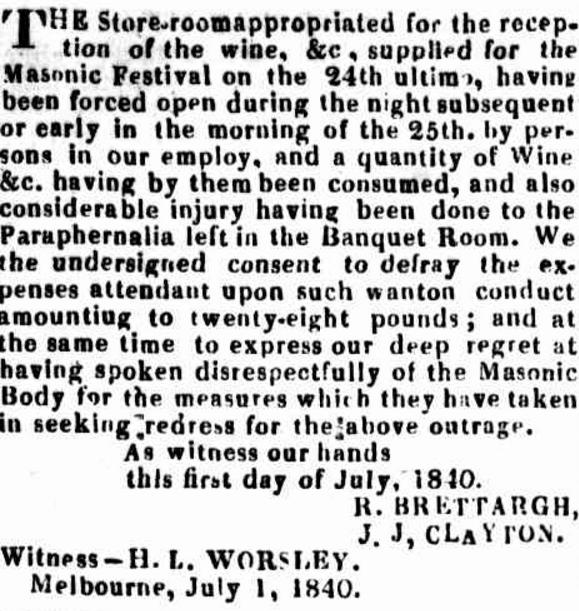
A scandal erupted in June 1840 when employees of two Melbourne businessmen broke into a store room and consumed the wines and spirits left over from the Freemasons Banquet.
The businessmen, R. Brettargh and J.J. Clayton, were forced to publish a witnessed public notice in the press, acknowledging the theft, and “considerable injury having been done to the paraphernalia left in the Banquet Room”.
The duo consented to defray the expenses of “such wanton conduct” amounting to £28. And “to express our deep regret at having spoken disrespectfully of the Masonic Body for the measures which they have taken in seeking redress for the above outrage”.

The press carried news that Governor Charles La Trobe would attend a Ball to be held in late July 1840.
“BALL.—It is the intention of several gentlemen who have recently arrived here with
cattle from Sydney, to acknowledge the attention which they have received from some of our fellow-townsmen during their visit, by giving a Ball to-morrow evening.
“The room selected is the one recently erected in Flinders-street, and used by the Masonic Body on their late Festival of St. John’s.
“Messrs. Yaldwyn, Manton, Dutton, Hawdon, Carne, Langborne, Arnold, and Fowler have been appointed stewards to effect the necessary arrangements.
“A deputation waited upon His Honor, on Friday, to request the pleasure of his attendance with Mrs. La Trobe, which invitation His Honor has accepted.”
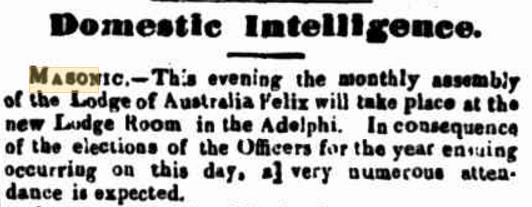
The Lodge of Australia Felix held its November 1840 meeting at the “New and extensive room” at the Adelphi.
William Meek, Esq. was unanimously elected to fill the Chair of the Lodge for the ensuing year, vacated by Isaac Hind, Esq.
“The strength of the fraternity enrolled under this Brother’s banner [was] announced as exceeding one hundred members.”
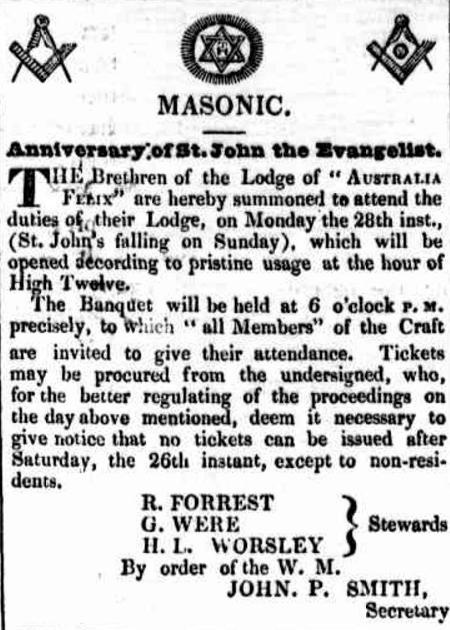
The Port Phillip Patriot newspaper (Dec. 3, 1940) carried an advertisement for the meeting connected with the ‘Anniversary of St John The Evangelist’.
The meeting “will be opened according to pristine usage at the hour of High Twelve”. A banquet was to follow at ‘6 o’clock P.M.’. Tickets were obtainable from the Stewards: R. Forrest, G. Were and H.L. Worsley, The advertisement was signed by John P. Smith, Secretary.
A land sale in December 1840 brought this comment from the Port Phillip Patriot: “Lots No. 2, and part of No. 3, of block 11, purchased at a recent sale of Government lands, for the benefit of the Mechanics’ Institute, are
to be offered for sale by the Auction Company on Monday next.
“Whilst so much well-timed competition has taken place at the sale of the other allotments purchased for various religious sects here, we cannot
doubt that the same spirit will be displayed by our townsmen upon the present occasion, especially when we remind them that we are to look for no assistance from the Government in furtherance of this excellent
institution.
“A portion of the allotment is, we believe, reserved, on which it is intended immediately to erect a building in every way adapted for the use of its members: this fact alone must render the remaining portio (independent of the excellence of its situation) of still greater value.
“It is a pity that some arrangement is not made between the Masonic Body, who are sadly in want of a suitable Lodge-room, we hear, and the members of the Mechanics’ Institute, to unite their funds, and to erect
a building not only adapted for both bodies, but also suitable for public meetings, balls, concerts, &c. We hope the hint may not be thrown away,” opined The Patriot.
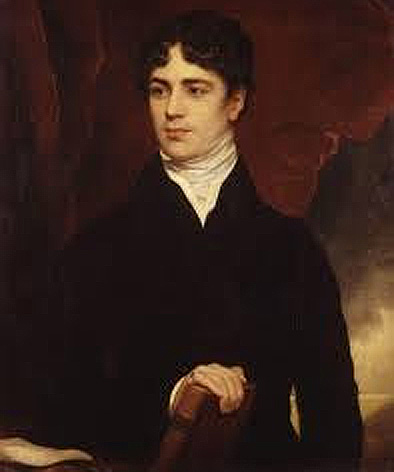
Also known as ‘Radical Jack’
The Masonic Year of 1840 concluded with the announcement of six months of mourning following the death of the Earl of Durham.
The Port Phillip Patriot (Dec. 24, 1840) said:
“We copy the following from
the Masonic Circular: — ” It having pleased
the All-wise Disposer of Human Events to
call from this transitory existence the highly esteemed and lamented Pro-Grand-Master The Earl of Durham, the W. W. Grand Master, participating in the grief which fills the breast of every Mason on this melancholy event, is anxious that every testimony of respect should he paid to the memory of the deceased Noble and Exalted Brother, and is therefore pleased to orde that the Grand Lodge and all subordinate Lodges shall he placed in mourning for six months from this date.”
